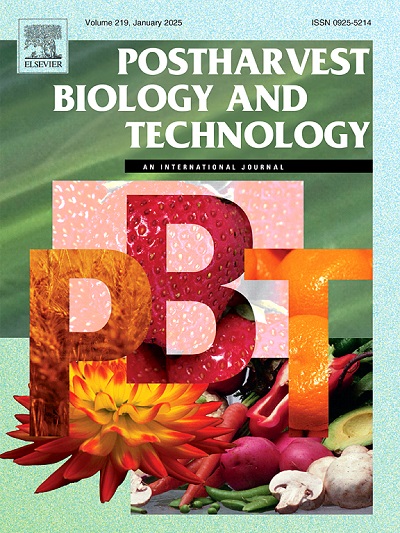1-MCP通过调节糖、有机酸和多酚代谢来调节冷藏桃果实的味觉发育
IF 6.8
1区 农林科学
Q1 AGRONOMY
引用次数: 0
摘要
1-甲基环丙烯(1-MCP)在水果冷藏保鲜方面具有广阔的应用前景。以往的研究表明,1-MCP处理可以影响水果冷藏过程中的风味属性,但研究大多集中在香气方面,而对水果味道的研究较少。本研究研究了1- mcp处理对冷藏(4 ± 1°C)和随后的货架期(20 ± 1°C)桃果实味道的影响。结果表明,1-MCP处理能有效减轻冷害症状,并在贮藏过程中保持较好的果实质地。电子舌分析显示,与对照相比,1- mcp处理后的果实甜度和苦味较低,但酸味和鲜味较高。代谢组学分析鉴定出5种与苦味形成相关的关键多酚类化合物(异库拉林酮、异槲皮素、儿茶素、3-咖啡酰奎宁酸和5-咖啡酰奎宁酸),通过分子对接分析发现它们与人类苦味受体具有较强的结合亲和力。转录组学分析表明,1-MCP通过调节多种代谢途径调控果实口感:抑制蔗糖降解同时促进糖代谢中己糖磷酸化,通过上调TCA循环相关基因促进有机酸合成,抑制苯丙素代谢途径基因减少多酚类化合物积累。虽然1-MCP在冷藏过程中有效地保持了水果的品质,减少了苦味的发展,但甜度的下降也可能影响消费者的接受度。需要进一步研究优化1-MCP的处理条件,以更好地平衡保存效果和味道形成。本文章由计算机程序翻译,如有差异,请以英文原文为准。
1-MCP regulates taste development in cold-stored peach fruit through modulation of sugar, organic acid, and polyphenolic metabolism
1-Methylcyclopropene (1-MCP) shows promising application potential in cold storage preservation of fruits. Previous studies have shown that 1-MCP treatment can affect fruit flavor attributes during cold storage, with most research focusing on aroma, while studies on fruit taste are limited. This study investigated how 1-MCP treatment influences the taste profile in peach fruit during cold storage (4 ± 1 °C) and subsequent shelf life (20 ± 1 °C). Results showed that 1-MCP treatment effectively reduced chilling injury (CI) symptoms and maintained better fruit texture during storage. Electronic tongue analysis revealed that 1-MCP-treated fruit exhibited lower sweetness and bitterness, but higher sourness and umami taste compared to the control. Metabolomic analysis identified five key polyphenolic compounds (isokurarinone, isoquercetrin, catechin, 3-caffeoyl quinic acid, and 5-caffeoyl quinic acid) associated with bitterness formation, which showed strong binding affinities with human bitter taste receptors through molecular docking analysis. Transcriptomic analysis demonstrated that 1-MCP regulated fruit taste by modulating multiple metabolic pathways: suppressing sucrose degradation while promoting hexose phosphorylation in sugar metabolism, enhancing organic acid synthesis through upregulation of TCA cycle-related genes, and inhibiting phenylpropanoid metabolism pathway genes to reduce polyphenolic compound accumulation. Although 1-MCP effectively maintained fruit quality and reduced bitterness development during cold storage, the decreased sweetness might also affect consumer acceptance. Further research is needed to optimize 1-MCP treatment conditions for a better balance between preservation effects and taste formation.
求助全文
通过发布文献求助,成功后即可免费获取论文全文。
去求助
来源期刊

Postharvest Biology and Technology
农林科学-农艺学
CiteScore
12.00
自引率
11.40%
发文量
309
审稿时长
38 days
期刊介绍:
The journal is devoted exclusively to the publication of original papers, review articles and frontiers articles on biological and technological postharvest research. This includes the areas of postharvest storage, treatments and underpinning mechanisms, quality evaluation, packaging, handling and distribution of fresh horticultural crops including fruit, vegetables, flowers and nuts, but excluding grains, seeds and forages.
Papers reporting novel insights from fundamental and interdisciplinary research will be particularly encouraged. These disciplines include systems biology, bioinformatics, entomology, plant physiology, plant pathology, (bio)chemistry, engineering, modelling, and technologies for nondestructive testing.
Manuscripts on fresh food crops that will be further processed after postharvest storage, or on food processes beyond refrigeration, packaging and minimal processing will not be considered.
 求助内容:
求助内容: 应助结果提醒方式:
应助结果提醒方式:


